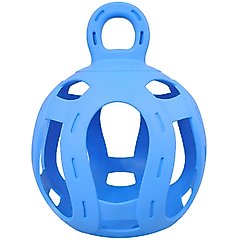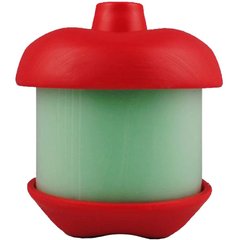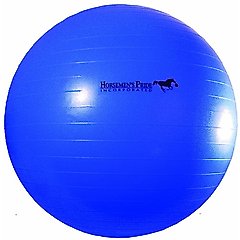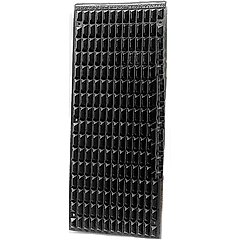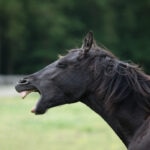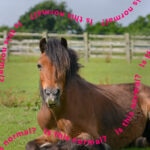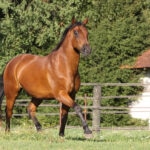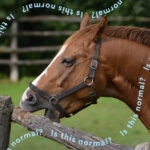Why Is My Horse Laughing? Is This Normal?
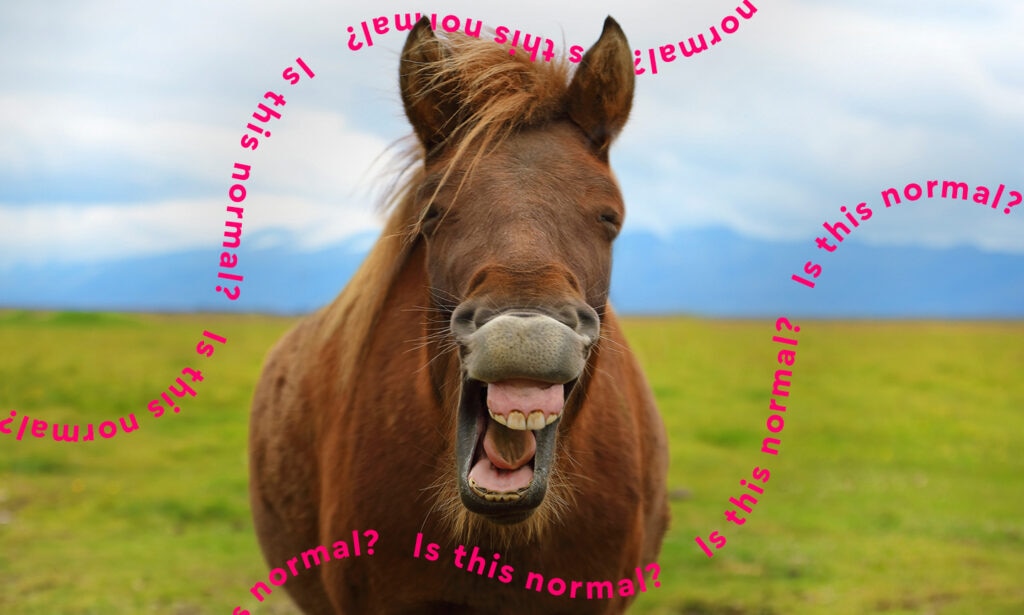
Photo by Chewy
Q: My mare has quite the sense of humor! After plucking my phone out of my jacket pocket and dropping it on the ground, she stretched her neck out and opened her mouth like she was laughing at me, then smacked her lips together. Was my horse laughing? Is it normal?
A: While you’re far from the first person to be “pranked” by a mischievous horse, animal behaviorists haven’t identified a behavior in horses equivalent to human laughter. That doesn’t mean horses can’t feel amusement—but if they do, they likely communicate it through horse-specific body language rather than audible sounds.
The neck-stretching, mouth-opening gesture you saw in your mare sounds like what some vets and trainers refer to as a “release.” Although it resembles a human yawn, this behavior signals the release of stress, not drowsiness.
To better understand behaviors that might be mistaken for horse laughing, we spoke with Katherine Houpt, VMD, PhD, professor emeritus of behavior medicine at Cornell University in Ithaca, New York; and Natalie Lord, DVM, a large and small animal veterinarian at Four Paws – Cuatro Patas in Austin, Texas.
Key Takeaways
- Horses do not laugh, at least not in a way recognizable to humans as laughter.
- The most common innocuous behaviors mistaken for a “horse laugh” are the Flehmen response, yawning for tension release, and nickering.
- Behaviors that may resemble laughter but are cause for concern include rare forms of choking and some boredom-based behaviors.
Can Horses Laugh?
As far as animal behaviorists know, horses don’t laugh the way humans do.
However, horses do like to play (after all, that’s where the term “horseplay” comes from). And research shows that horses can distinguish between joyful and angry human facial expressions and voices.
So, while horses may experience some of the emotions we associate with laughter, they likely don’t express them through vocalizations.
“My horse is laughing internally at me all the time!” Dr. Lord jokes. “I do think horses are keen observers of their environment, and what we do is mostly odd to them. If horses laugh, it’s not in the way humans do.”
Why Do Horses Laugh?
Several common behaviors in horses may resemble what could be considered laughter.
1. The Flehmen Response or “Stud Laugh”
If you hear a horse owner saying their horse was “stud laughing” or “smiling,” they’re probably talking about the Flehmen response. It’s a lip-lifting behavior triggered by strong smells, often misinterpreted as a horse’s smile.
“Stud” refers to stallions, who use the Flehmen response to determine whether or not a mare is in heat. But the Flehmen response is seen in horses of both sexes.
Dr. Houpt says the Flehmen response is normal; if your horse often displays it after touching you, it’s probably about your cologne, not their sense of humor.
2. Long Yawning
Research indicates that horses may yawn when receiving calming medications, but they may also yawn when experiencing stress.
Without a definite scientific explanation for horse yawning, many trainers and horse care professionals refer to yawning as a “release.” A “release” is a type of behavior that can help horses relieve tension.
“After bodywork or acupuncture, I often see my equine patients shake their heads and yawn,” Dr. Lord says. “It’s related to endorphins and oxytocin. They might be feeling a tingling-down-their-spine sort of sensation.”
3. Nickering or “Chuckling”
If you enter the stable to feed your horse, you might hear horses making a soft, low, pulsating sound that resembles a human chuckle. Horses often combine this vocalization with repeated head bobbing over the fence or stall door.
While it may sound like a laughing horse, Dr. Houpt and Dr. Lord agree there’s only one way to translate a nicker directed to an approaching human at mealtime: “Feed me!”
Nickering in the absence of food can be a friendly greeting or an invitation to come closer.
4. Pleasure Face (Mutual Grooming)
Horses may not laugh, but “they do have a pleasure face,” Dr. Houpt says. “They stick out their noses like tapirs,” she adds. “It’s most likely to occur when they are rubbing their tails.”
If you see your horse extend their upper lip far past their lower lip, with trembling or twitching motions, you’re seeing the pleasure face in action.
To trigger this behavior, Dr. Lord suggests scratching your horse’s withers, or another itchy spot they can’t reach on their own.
When Should I Be Worried About Horse Laughing?
There’s no need to worry if your horse yawns, nickers, makes a pleasure face, or displays the Flehmen response.
However, our experts pointed to two behaviors sometimes misdescribed as “horse laughing” that can be worrisome.
If They’re Dry Choking
Choking in horses usually involves large amounts of fluid coming out of the nose. But, Dr. Lord has seen rare cases where this fluid isn’t present and the choking horse might look like they’re “throwing their head back in laughter.”
“I sometimes see horses that have a dry stick or a wad of dry hay stuck in their esophagus, not a bolus of food with liquid streaming out their nose,” she says. “They’ll snake their neck back in an S-shape, then stretch it out in [an unnatural way].
She adds that while a horse is dry-choking. They may make hacking and gurgling sounds and wrench their neck in distress.
If your horse is choking, contact a veterinarian immediately.
If They’re Bored
Some horses may repeatedly perform actions like head-nodding and lip-flapping to entertain themselves—behaviors that might resemble “laughing” to human observers. However, these habits are usually signs that your horse needs more physical or mental stimulation.
If possible, Dr. Lord recommends keeping horses in a friendly, social stall environment with plenty of grazing. That way, they’ll never be bored.
However, Dr. Lord acknowledges that this isn’t always realistic. “We are more densely populated, so we have to use stalls and paddocks, and we’ve bred horses prone to obesity that shouldn’t be on grass 24/7,” she adds.
For horses who must live in a smaller space, Dr. Lord has a few boredom-fighting recommendations:
- Offer hay in a ball, like the Horsemen’s Pride Jolly Hay Ball, so horses push it around with their noses on the ground, like they’re grazing.
Recommended Product
- Try stall snacks that the horse licks over an extended time, like the Horsemen’s Pride Stall Snack Holder.
Recommended Product
- Give them a big ball, like the Horsemen’s Pride Mega Ball Horse Toy, to chase in turnout.
Recommended Product
- Install horse scratchers, like the Shires Equestrian Products Horse Scratcher, in stalls/paddocks to simulate social grooming.
Recommended Product
- Get creative with supervised play by turning what you already own into horse toys, from teddy bears to sandbags and party streamers. Just make sure to remove any shredded bits before a horse swallows any part of an improvised toy!
FAQs About Horse Laughing
Why do horses curl their lips up?
The most common reason for horses to curl their lips up like they’re “smiling” is the Flehmen response, which is one way horses get more information about an unusual odor.
Is a horse laughing ever a sign of pain or illness?
Possibly. Some owners might misinterpret compulsive behaviors like head-bobbing or an emergency like dry choke as “laughing.” Understanding your horse’s body language can help you accurately interpret their behaviors.
Do some horses laugh more than others?
Yes, some horses may exhibit behaviors that humans misinterpret as “laughing,” such as nickering and head-bobbing, more frequently than others. Every horse has a unique personality.
What should I do if my horse won’t stop “laughing”?
Although most behaviors that horse owners may see as “laughing” are harmless, any sudden change in your horse’s behavior that worries you is worth a call to your equine veterinarian.
